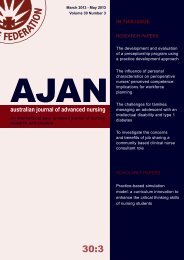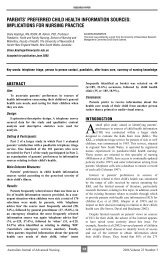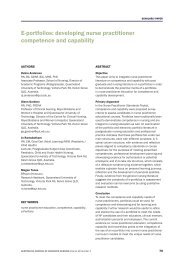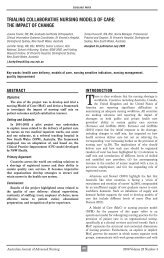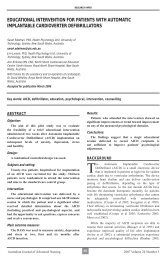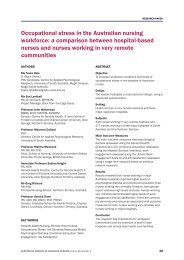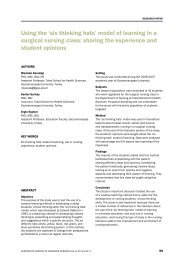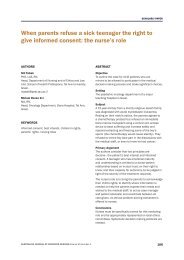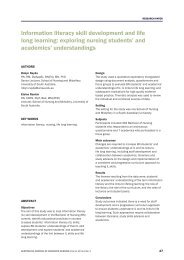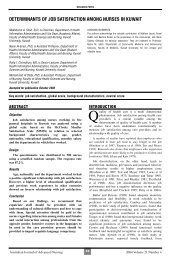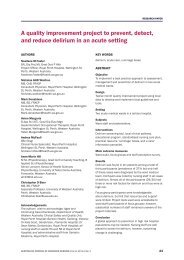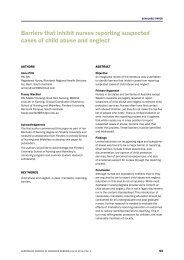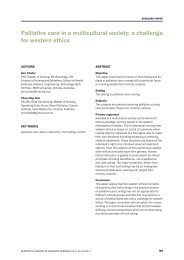australian journal of advanced nursing
australian journal of advanced nursing
australian journal of advanced nursing
Create successful ePaper yourself
Turn your PDF publications into a flip-book with our unique Google optimized e-Paper software.
fail or avoid addressing, assessing and discussing<br />
sexual problems with their patients and prefer to deal<br />
with it when patients bring up their sexual health.<br />
Barriers to taking a sexual history in assessment<br />
include lack <strong>of</strong> time; fear <strong>of</strong> intruding or <strong>of</strong>fending<br />
the patient, belief that cancer patients are too ill or<br />
not interested in sex, belief that disfigured bodies<br />
are not sexually attractive, lack <strong>of</strong> adequate training/<br />
skills, cultural issues; gay patient, single patient,<br />
different cultural beliefs about illness and disease,<br />
age and gender <strong>of</strong> patient, presence <strong>of</strong> a third party<br />
(partner, parent) and a fear <strong>of</strong> opening ‘Pandora’s<br />
box’ in regard to previous sexual assault or difficult<br />
relationship (Sundquist and Yee 2003).<br />
Spirituality also needs to be addressed more<br />
proactively in hospital settings. Spiritual well‑being<br />
is a subjective experience that occurs both within<br />
and outside <strong>of</strong> traditional religious systems (Rodin<br />
et al 2009); spirituality is especially awakened at the<br />
end <strong>of</strong> life as patients seek purpose and meaning<br />
(Demierre et al 2003). A palliative care centre<br />
review conducted by Mishra et al (2010) found<br />
98% <strong>of</strong> patients interviewed with <strong>advanced</strong> cancer<br />
were spiritually grounded to their faith and religion<br />
and believed that God would help them. Another<br />
benefit <strong>of</strong> patients faith was it was found it helped to<br />
decrease these patients’ anxiety. A review conducted<br />
by Mazanec et al (2010) found that spirituality was<br />
the strongest predictor <strong>of</strong> social well‑being and a<br />
significant predictor <strong>of</strong> emotional and functional<br />
well‑being in the quality <strong>of</strong> life <strong>of</strong> patients and families<br />
with cancer. Screening for spiritual distress is an<br />
integral component <strong>of</strong> psychosocial care provided by<br />
oncology nurses and may be facilitated by a simple<br />
assessment tool. Evaluation <strong>of</strong> a patients’ sense <strong>of</strong><br />
spiritual well‑being may also provide another avenue<br />
by which to assess optimism, given the significant<br />
correlation between optimism and spirituality and<br />
finding that spirituality significantly predicted health<br />
related quality <strong>of</strong> life (Mazanec et al 2010). Patients<br />
with spiritual distress need to be referred to a trained<br />
spiritual care provider, which are either present or<br />
can be accessed in all Australian hospitals.<br />
Optimism is a personality feature that has been<br />
associated with psychological well‑being and<br />
SCHOLARLY PAPER<br />
positive health outcomes in healthy individuals<br />
and in patients with cancer (Mazanec et al 2010).<br />
Optimism and pessimism have been linked to<br />
coping styles; optimists tend to use active problem<br />
solving strategies when confronted with a stressor,<br />
whereas pessimists generally use avoidant coping.<br />
Optimism is a complex characteristic with cognitive,<br />
emotional and motivational aspects. Mazanec et al<br />
(2010) suggest that bolstering optimism by reducing<br />
negative thoughts is an interventional strategy that<br />
may have implications for patients with cancer.<br />
Identifying patients coping strategies can help to<br />
identify the amount and type <strong>of</strong> psychosocial support<br />
the patient will need.<br />
Hope is an important component in psychosocial<br />
care. Reb (2007) states that hope includes reflection,<br />
re‑evaluation, finding meaning and the development<br />
<strong>of</strong> new goals. Revising goals so they are flexible and<br />
more realistic allows people to be more motivated to<br />
achieve attainable goals. Hope is not only based on<br />
a cure or being disease free but attaining the best<br />
quality <strong>of</strong> life they can have. Focusing on attainable<br />
goals can promote a sense <strong>of</strong> meaning and personal<br />
control. Nurses find the balance between truth<br />
telling and nurturing hope is an important aspect <strong>of</strong><br />
fostering hope (Sch<strong>of</strong>ield et al 2006). Some nurses<br />
believe fostering false hope <strong>of</strong> a cure when a cure is<br />
not possible ultimately can be a source <strong>of</strong> regret as<br />
it may hinder patients and their family from making<br />
sensible treatment and lifestyle decisions. A study<br />
conducted by Reb (2007) found that communication<br />
style and relationships with healthcare providers<br />
were significant recurring themes that influenced<br />
hope. Nurses need to be able to engage patients<br />
and their families positively and to provide hope no<br />
matter what the shape hope comes in.<br />
What are the limitations to providing effective<br />
psychosocial care?<br />
To provide effective psychosocial care, it is a<br />
requirement that we build a relationship with the<br />
patient, however to build this relationship there is<br />
need to gain the patients trust and it is not until<br />
this trust is gained that psychosocial care can be<br />
provided. Primary care <strong>nursing</strong> is essential for both<br />
AUSTRALIAN JOURNAL OF ADVANCED NURSING Volume 28 Number 3 64



